人教版英语八下 unit3 复习教案
(完整版)英语人教版八年级下册Unit3教学设计

(完整版)英语人教版八年级下册Unit3教学设计课题:Unit 3 Could you please clean your room?Period 1 (Section A 1a-1c)学习目标【Learning objectives】1.掌握单词: rubbish, fold, sweep, floor, take out the rubbish.2.学会礼貌地提出请求并熟练练习对话。
重点和难点【Important and difficult points】教学重点:能熟练拼读单词及短语rubbish, fold, sweep, floor, take out the rubbish.教学难点:学会用句型“Could you please…”来礼貌地提出请求。
预习内容【prepare lessons before class】1.要求学生掌握单词rubbish, fold, sweep, floor, take out the rubbish并指导学生找出家务活的表达方式。
2. 指导学生用“Could you please…”造句。
学习过程【Learning process】一、预习反馈,明确目标【Preview feedback, Clear objective】1.本节课的单词你有更多的是积累吗?2.写出更多家务琐事的表达方式:3.你知道怎样礼貌地提出请求吗?二、创设情境,自主探究【Create situations, Self inquiry】1. T: 1) Do you help to do any chores at home ?2) What work do you usually do to help your parents?3) Which one are you good at?Ss: Discuss the teacher’s questions with their partners.2. Check(√) the chores you can do in 1a and add more chores.三、展示交流,点拨提升【Display communication, Coaching to enhance】1. T: 1. Who are the two people in the picture? Why do yousay so?2. Where are they? How do you know?2. Read the chores and add more chores.3. Use “Could you please…” to make a conversation just like Peter and his mother. 1c.4. Listen to 1b and check their answers.四、师生互动,拓展延伸【Teacher-student interaction, Development】【归纳】Make polite requests. ------ Could you please…? Yes, sure./ OK, but……【拓展】1.Can you do some dishes?2. rubbish的同义词:eg. You do talk rubbish sometimes. 胡言乱语【辨析】1. do 与make2. clean 与sweepeg. Let’s clean the house. You sweep the floor and I wash the dishes.五、达标测评, 巩固提高【Evaluation standards,Consolidation and improvement】基础题I. 根据句意及首字母提示写出单词。
英语:Unit 3教案(人教新目标八年级下)
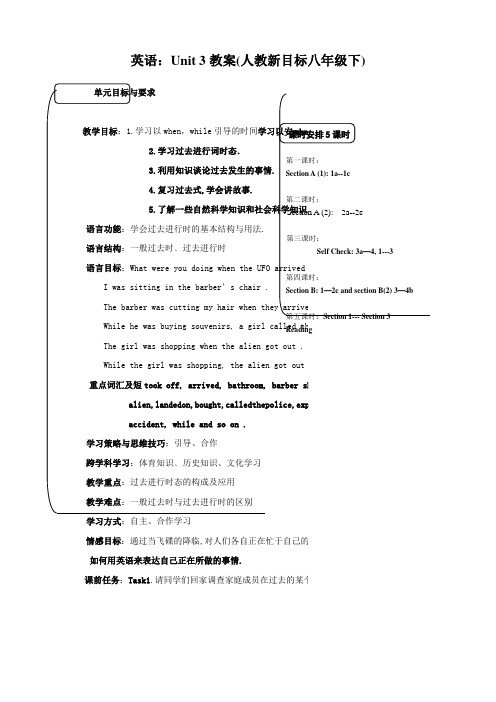
英语:Unit 3教案(人教新目标八年级下)学习方式:自主、合作学习情感目标:通过当飞碟的降临,对人们各自正在忙于自己的事如何用英语来表达自己正在所做的事情.课前任务:Task1.请同学们回家调查家庭成员在过去的某个时第一课时教学内容与分析教学内容:Section A (1): 1a---1c教学目标:1.能够掌握基本单词和词汇。
2.学会过去进行时的基本结构与用法。
3.能够运用以when 引导的时间状语从句。
4.能够运用基本句型进行提问。
学习任务:我的爱好目的:通过学生小组活动,调查在过去的不同时间里做不同的事情,学会使用过去进行时态,培养学生应用英语进行交际的能力。
语言技能:Listening .Speaking .Reading ﹑Writing语言知识:过去进行时的用法及复习一般过去时态提示词语及句型:got out, cut, barber shop, bathroom, kitchen, well, bathroomWhat were you doing when the UFO arrived ?I was sitting in the barber’s chair .The barber was cuttingmyhair when they arrived .教学重点、难点分析:教学重点:基本单词,词汇和句型教学难点:能够运用过去进行时谈论人们所做的事情.课前准备1.本课时的教学课件2.课前发给学生表格向学生布置任务:在表格中写出有关内容。
教学设计教学步骤建议和说明Teaching Steps :Step 1 :Warm-up and revision1.Share an English song .2.Greetings and free-talk .从平常的谈话中轻松导入本课句型,信息沟通使谈话非常真实,而又浅显What are you doing ? What did you do last night ?3.Show slides: Revise: is/an/are +动词ing4.Brain storm:Collect the names of activities which said by the students.Step 2 :Presentation :1.Watch a video2.By asking: What’s this in English ?Have you even seen it ?3.Teach:UFO, bedroom, bathroom, bedroom, kitchen,living-room, barber shopStep 3 :Work on:SB Page 18 , 1a .1.Point to the sentences .Read the sentences .Explain what each one means.2.Teach :barber shop, well, bathroom, bedroom, kitchen, get out, cut3.Look at the picture.. Point out the six people. Match the statements with the people in the picture4.Check the answers .5.Practice reading .Step 4 :Work on:SB Page 18 , 1b .1. Read the instructions .Make sure the Ss understand whatthey should do .2. Look at the dialogue in the picture .Explain :过去进行时态的构成: was / were + doing .用法:表示过去某一时刻或某一段时间正在进行的动作,一般用时间状语来表示。
人教版初中八年级英语下册第三单元Unit 3 教案含教学反思

Section A 单词rubbish n.垃圾;废弃物fold v.折叠;对折sweep v.(swept)扫;打扫floor n.地板mess n.杂乱;不整洁throw v.(threw)扔;掷neither adv.也不; pron.两者都不shirt n.衬衫pass v.给;递;走过;通过borrow v.借;借用lend v.(lent)借给;借出finger n.手指hate v.厌恶;讨厌while conj.与……同时;当……的时候;而;然而chore n.杂务;乏味无聊的工作snack n.点心;小吃;快餐短语take out the rubbish 倒垃圾all the time频繁;反复as soon as 一……就……句型1.Peter,could you please take out the rubbish? 彼得,你能把垃圾倒了吗?2.And she won’t be happy if she sees this mess.而且如果她看到这么乱,她会不高兴的。
3.Could I at least finish watching this show?至少等我看完这个节目可以吗?4.For one week, she did not do any housework and neither did I.在—周时间里,她没有做任何家务,我也没有做。
that everyone should do their part in keeping it clean and tidy.既然他们和父母生活在同一所房子里,他们就应该知道每个人都应该为保持房屋的干净和整洁尽一份力。
5.The earlier kids learn to be independent,the better it is for theirfuture.孩子们越早学会独立,对他们的未来就越好。
语法情态动词could的用法掌握本单元中的重点词汇及相关短语,并灵活运用。
Unit3I’mmoreoutgoingthanmysister.SelfCheck教案人教版八年级

Unit3 I’m more outgoing than my sister.Self CheckName Class GN Date Total points 20 score 【Examination Point】比较级的综合考查。
【Studyaims】1.复习如何对两者进行比较。
能够综合运用所学的知识来对两个事物或人物进行对比。
2.总结回顾形容词和副词的比较级形式,并熟练掌握所学的知识。
【Key&difficult points】能够综合运用所学的知识来对两个事物或人物进行对比。
【Leadingin】以复习整合旧知方式导入【Step one】快速回顾本单元重点单词及短语,完成下列习题;思考完成课本P24页Self check的习题(5mins)1.爱交际的 4.喧闹地;大声地5.轻声地;轻柔地6.工作努力的;辛勤的8.比赛;竞争9.极好的;了不起的10.清楚地;明白地12.有才能的13.真正;确实14.笑;发笑15.必需的;必要的16.(使)破;损坏17.分享;共享18.相像的;类似的19.信息;消息20.与...不同21.使显现;使表现出22.确切地说;事实上24.与...相像的;类似的26.善于与...相处【当堂训练】当堂训练(7mins完成,书写认真,规范)I.完成句子(每小题2分,共10分)1.我怎样才能把英语讲得和你一样好?-熟能生巧。
-How can I speak English you?-Practice makes perfect.2.只要天气好,早晨我就锻炼。
I exercise in the morning the weather is fine.3.我的主意和你的相似。
My idea yours.4.事实上,他比我聪明一点。
, he is a little me.5.这块手表与那块不一样。
This watch is that one.II.补全对话(每小题1分,共5分)A:Mary,who is Lisa?B:Oh,she is my best friend.We study in the same school.A:1. ?B:She has long straight hair. And she is thinner and taller than me.A:2. ?B:She is fourteen. She is one year older than me.A:3. ?B:Yes,she likes to do the same things as me.A:4. ?B:She likes playing volleyball.A:Oh,I like playing volleyball, too. Can you introduce her to me?5. . B:OK. I think you will bee good friends soon.IIIschool. She has the same hobbies(爱好)as me,so it 1. easy for us to bee friends.Susan and I are both 15 years old. She is 2. than me and much funnier. Her hair is black and she has beautiful big 3. . She is very popular in our class and everyone 4. her. She is also an excellent student.She often gets the best 5. in the exams.Her favorite subject is French. She would like to 6. to Paris next summer because her uncle lives there. She tells her parents that if she goes there,she will practice 7. French a lot.We see each other every day. We usually walk to school together in the morning as she 8. near my house. At weekends, we love going out with friends or going to the library.We sometimes go 9. or go to the movies. We both enjoy cartoons. Last Sunday was very special because Susan 10. a party for my birthday. It was an interesting party!Signature:_______________。
2020-2021学年人教版英语八年级下册第三单元辅导学案(无答案)

VIP一对一个性化教案本次课教案:考点一:Peter, could you please take out the rubbish? 彼得,请你倒一下垃圾好吗?(P17) 【考点梳理】Could you please do sth. ?请你(做)......好吗?用于提出请求,希望得到对方的肯定回答,说话的语气比较客气委婉。
此处could 不是can的过去式,而是委婉、礼貌的说法。
回答用can,而不用could。
常用答语肯定回答:Sure. / Of course. / Certainly. /No problem. /Good idea. / I agree /can/may.否定回答:Sorry, I can’t.【考点拓展】表示请求的几种方式Would you please do....? 请你做...好吗?Would you like/love to do....? 你愿意做...吗?Would you mind doing....? 你介意做...吗?Shall I/we do....? 我/我们做....好吗?Let's do.... 让我们做...吧。
【小试牛刀】()1. —Could I borrow your camera?— ___________, but please give it back by Saturday.A. I am sorryB. Of courseC. Certainly notD. No, thanks()2 . —Sir, could you please put out your cigarette? This is a smoke-free(无烟的)school.— __________.A. I'm sorry about thisB. No problemC. Sure, I'd love toD. Never mind()3. Tom, would you please __________ the box? It’s for your sister.A. not openB. don’t openC. not to openD. to not open考点二:Could I at least finish watching this show? 至少等我看完这个节目可以吗?(P18) 【考点梳理】at least的用法at least意为“至少(可以或应该)”,其反义词组为at most, 表示“至多;不超过”。
Unit3SectionA3a-3c教案人教版八年级英语下册

环节一:Prelistening1教师活动1T introduces the background of this class. Peter’s classmate Nancy is talking with his brother Tony about doing chores. What may happen during their talk? 学生活动 1Ss read the background of the lesson活动意图说明:通过设置背景,让本节课生动鲜活地和学生的生活实际联系到一起,激发学习兴趣。
环节二:listening 1教师活动2Step 2T asks Ss to listen and answer the following questions.1.What does his sister want Tony to do?2.What does Tony want to do first?3.Where do you think their mother is? 学生活动 2Ss look at the picture and guess the possible relationship between the two children .Ss then listen to the conversation and answer the following questions.活动意图说明:通过插图激发学生关注听力内容,通过回答问题串帮助学生理清Nancy对于做家务的看法,为后文的讨论埋下伏笔。
环节三:listening 2教师活动3Step 3T asks Ss to listen again. Fill in the blanks. After that, try to retell it and guess what will happen next. 学生活动 3Ss listen and fill in the blanks and then guess what will happen next.活动意图说明通过排序引导学生复述文本,熟悉对话,同时通过合理预测引出阅读文章内容。
【人教版】英语八年级下册unit 3 section B-2教案

Step 2
Activity 2b.
Skim the following letters. Which one agrees and which one disagrees?
Step 3
Make true or false.
Unit 3 Section B-2
Class Type
Reading and writing
Objectives
1.To be able to make polite requests.
2.To be able to ask for permission.
Key structure
1.Could you please + do sth?
Step 4
Activity 2c.
According to Ms. Miller and Mr. Smith, what are the pros and cons about kids doing chores?
Step 5
Activity 2d.
Write one sentence with each phrase from the letters.
Step 8
Activity 3a.
Do you think children should do some chores at home? Why or why not? Discuss this with a partner and take notes.
Step 9
Activity 3b.
Write a letter to the Sunday Mail and express your opinion.
人教版八年级英语下册Unit3Couldyoupleasecleanyourroom全单元教案
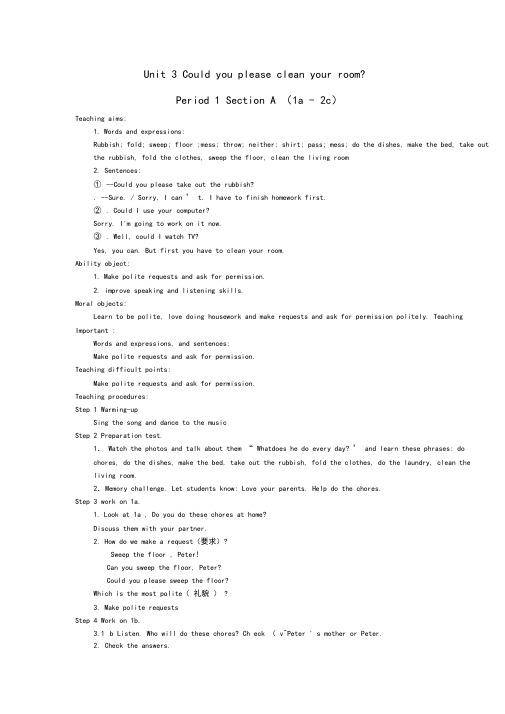
Unit 3 Could you please clean your room?Period 1 Section A (1a - 2c)Teaching aims:1.Words and expressions:Rubbish; fold; sweep; floor ;mess; throw; neither; shirt; pass; mess; do the dishes, make the bed, take out the rubbish, fold the clothes, sweep the floor, clean the living room2.Sentences:①--Could you please take out the rubbish?. --Sure. / Sorry, I can ’ t. I have to finish homework first.②. Could I use your computer?Sorry. I'm going to work on it now.③. Well, could I watch TV?Yes, you can. But first you have to clean your room.Ability object:1.Make polite requests and ask for permission.2.improve speaking and listening skills.Moral objects:Learn to be polite, love doing housework and make requests and ask for permission politely. Teaching Important :Words and expressions, and sentences:Make polite requests and ask for permission.Teaching difficult points:Make polite requests and ask for permission.Teaching procedures:Step 1 Warming-upSing the song and dance to the musicStep 2 Preparation test.1.Watch the photos and talk about them “ Whatdoes he do every day? ’ and learn these phrases: dochores, do the dishes, make the bed, take out the rubbish, fold the clothes, do the laundry, clean the living room.2.M emory challenge. Let students know: Love your parents. Help do the chores.Step 3 work on 1a.1.Look at 1a , Do you do these chores at home?Discuss them with your partner.2.How do we make a request(要求)?Sweep the floor , Peter!Can you sweep the floor, Peter?Could you please sweep the floor?Which is the most polite(礼貌) ?3.Make polite requestsStep 4 Work on 1b.3.1 b Listen. Who will do these chores? Ch eck ( v^Peter ' s mother or Peter.2. Check the answers.Step 5 Group work .Group work: Family drama( 家庭短剧)1.Each group is a family.2.We need to clean the house.3.To make a similar conversation of listening material.Example:Mom : We need to clean the house. We are going to have a party.Dad : Could you please sweep the floor?Peter: No problem.Grandpa: Well, could you please do them? I ’ m going to clean the living room.Step 6 Listening 2a&2b1.Peter asks his father if he can do four thing s. What does his father say? Check ( V) yes ” or“ no” . Listen again. Draw lines to the reasons.2.Check the answers .Step 6 Pair work.Make conversations using the information in 2a and 2bA:Could I use your computer?B:Sorry. I ’ m going to work on it now.A: Well, could I watch TV?C:Yes, you can. But first you have to clean your room?Period 2 Section A (2d , grammar )Teaching aims:1.Words :Mess; borrow, invite, disagree, snack, teenager2.Sentences:Yes, because Mom will be back from shopping any minute now. And she won she sees this mess.t be happy if But the house is already pretty clean and tidy!Could you buy some drinks and snacks?Could I invite my friends to a party?Could I go out for dinner with my friends?OK/ Sure, that should be OK.No, you can ’ t. You have a basketball game tomorrow.Ability object:1.Make polite requests and ask for permission.2.improve speaking and reading skills.3.Master the structures of could .Moral objects:Learn to be polite, love doing housework and make requests and ask for permission politely.Teaching Important :Words and expressions, and sentences:Make polite requests and ask for permission.Teaching difficult points:Make polite requests and ask for permission.Teaching procedures:Step 1 Warming-up .1.Watch a video and answer:Who is the girl in the movie?Is the house clean or dirty?What did she do?2.Do some exercises.Step 2 Work on 2d.1.2d Read the conversation and answer:What chores will Tony have to do?2.2d Role - play the conversation.Step 3 Presentation.1.Read ,think the knowledge.2.Give some explainationsStep 4 Work on 4a.1.Write R for requests and P for permissions. Then match each one with the correct response.2.Check the answers.Step 5 Work on 4b.1.4b Fill in the blanks in the conversation.2.check the answers.Step 6 Work on 4c.4c Make a list of things your group needs to do for a camping trip. Then discuss who will do bring a tent them and complete the chart.Example:A:Could you please bring Liu Chang?B:Sure. And could you please •••?C:Sorry, I can ' t. I have to …Step 7 Homework.Period 3 Section A (3a-3c )Teaching aims:1.Words and expressions:throw, neither, shirt, all the time, as soon as.2.Sentences:①. He wanted a walk, but I was too tired. I threw down my bag and I went to the living room.②. “ No! ” she replied angrily. h TV“ayllothuewtaimtce and never help out around thehouse!I can ’ t work all day and do housework all evening. ”③. “ well, I work all day at school, too! I ’ m just as tired as yaocuka. re! ” I shouted b Ability object:1.Make polite requests and ask for permission.2.improve speaking and reading skills.Moral objects:Learn to be polite, love doing housework and make requests and ask for permission politely.Teaching Important :Words and expressions, and sentences:Make polite requests and ask for permission.Teaching difficult points:Make polite requests and ask for permission.Teaching procedures:Step 1 Warming-upStep 1 Lead in.1.T: We have leaned the phrases about chores. Look at the picture, what are they doing?Do you often do chores at home ?Show the title.Step 2 2b Reading.2.Look at the picture and answer :Does Nancy often do any housework?3.Read the passage carefully and answer.How does Nancy ’ s and her mother’ s feelings change?4.Read the sentences.5.Read the passage and answer the following questions.①Why was Nancy ' s mom angry with Nancy?② Did they solve the problem? How?③ Can you infer what Nancy ’ s mother will feel ?6.What do you learn from the message?We need to share the housework to have a clean and comfortable home .Can you infer what Nancy will do at home?Step 3 Work on 3b.Read the story again and read the sentences below. Underline the sentences from the readingthat mean the same thing.1.Neither of us did any housework for a week.2.My mom came over as soon as I sat down in front of the TV.3.You ’ re tired, but I ’ m tired, too.Step 4 Work on 3c.. Decide whether the underlined words in the sentences are verbs or nouns. Then write another sentence using the underlined word in the other form.1.Could you take the dog for a walk? (noun)2.Could I watch one show first?3.I can ’ t work all day.4.You watch TV all the time.5.“ What happened? ” she asked in surprise.Step 5 Homework.Period 4 Section B (1a-1e )Teaching aims:New words: snack teenager borrow invitePhrases: buy some drinks and snacks; borrow some money; invite sb. to a party/to do sth. Sentences :--Could you please clean your room?--Yes, sure. / Sorry, I can ' t. I have to do my homework.-- Could I invite my friends to aparty?--Of course/ Yes, you can /No, you can Ability object: t. You have to1.Make polite requests and ask for permission.2.improve speaking and listening skills.Moral objects:Learn to be polite, make requests and ask for permission politely; and love parents. Teaching Important :Words and expressions, and sentences:Make polite requests and ask for permission.Teaching difficult points:Make polite requests and ask for permission.Teaching procedures:Step 1 lead-in.1. Show the title.2. DiscussionQ: Do you help your parents do the chores at home?Q: Do your parents ask you to do a lot of things forthem?What do your parents ask you to do?What do you ask your parents Step 2 Work on 1a.1.What do teenagers ask their parents 'permission for?' permission for? What do parents ask their teenagers todo? Write parents or teenagers next to each phrase.2. Check the answers.Step 3 Finish 1b.Use the phrases in 1a to makeconversations.Example :Parents : Could you clean your room ?Child : Yes, I can.Child : Could I invite my friend to aparty ?Parents : No, you can't .Useful language:1.Parents: Could you please …?Child: Yes, sure. / Sorry, I can ' 2.Child: Could I •••? t. I have to ...Parents: Yes, you can. / No, you can t.You ...Step 4 Finish 1c and 1d.1.Listen to a conversation between Sandy and her mom. Check ( V ) Oh wdhings in 1a thhear.2.Listen again. Fill in the chart.Step 5 Finish 1e.You are having a party. Invite your partner to come your party and ask for help withthese things. So, talk about the following things with your partner.e.g. A: Would like to come to my birthday party?B: Yes, I ' d love to./Sorry, I can ' t. I have to …A:Could you please take out the rubbish?B:Yes, sure./No, I can ' t. I have to do …Step 6 Homework.Period 5 Section B (2a-2e)Teaching aims:1.Learn and review some important phrases and target languages.2.Review how to make polite requests how to ask permissions politely3.Read the letters carefully and surf the Internet, try to find out more reasons to supportyour idea, and then write a letter to th e person that you don ’ t agree with.Ability object:1.Learn how to debate and show your own opinions.2.Practice speaking, reading and writing skills.3.Interview your friends, your teachers or your parents about their opinions about kids doingchores and take notes.Moral objects:Discuss with your partners and show your own opinions.Teaching Important :Learn and review some important phrases and target languages.Teaching difficult points:1.Interview your friends, your teachers or your parents about their opinions about kids doingchores and take notes.2.Read the letters carefully and surf the Internet, try to find out more reasons to supportyour idea, and then write a letter to the person that you don ’ t agree with.Teaching procedures:Step 1 Warming-up1.Review.Step 2. 2a. pre-reading.2.Discuss the questions with your partner① What do you often do to help your parents at home?② Do you think kids should help out with chores at home?3.New words learning.Step 3. While reading1.What ’s “ Skimming “2.2b. The Sunday Mail magazine invited parents to write about whether they think young peopleshould do chores at home. Skim the following letters. Which one agrees and which onedisagrees?3.Reading.①. Read the examples, and guess the meanings of “ pro” and “ con” .②2c. According to Mr. Smith and Ms. Miller, what are the pros and cons about kids doingchoresStep 4 Post reading.1.Be a good debater. Let ’s have a debate.2.2d. Write one sentence with each phrase from the letters.3.2e Discuss the questions with a partner.Step 5 Homework.Period 6 Section B (3a-self check )Teaching aims:1. WordsFair; unfairnguage:help with housework and chores at home have enough stress from schoolspend the time on school work in order toThere is no need for them to …It is important for sb. to do sth.It ' s not enough to … develop children ' s independence The more •••, the more …Ability object:1.Learn how to show your own opinions.2.Practice speaking, and writing skills.Moral objects:Discuss with your partners and show your own opinions. Teaching Important :1.Learn how to show your own opinions.2.Practice speaking, and writing skills.Teaching difficult points:1.Learn how to show your own opinions.2.Practice speaking, and writing skills.Teaching procedures:Step 1 Warming-upSection B 2 (3a —Self check)Step 1 RevisionDiscuss the questions with a partner. And take notes.Do you think children should do some chores at home? Why or why not?1.信头:发信人地址和日期。
人教版初中八年级英语下册第三单元Unit 3 教案含教学反思

Section A 单词rubbish n.垃圾;废弃物fold v.折叠;对折sweep v.(swept)扫;打扫floor n.地板mess n.杂乱;不整洁throw v.(threw)扔;掷neither adv.也不; pron.两者都不shirt n.衬衫pass v.给;递;走过;通过borrow v.借;借用lend v.(lent)借给;借出finger n.手指hate v.厌恶;讨厌while conj.与……同时;当……的时候;而;然而chore n.杂务;乏味无聊的工作snack n.点心;小吃;快餐短语take out the rubbish 倒垃圾all the time频繁;反复as soon as 一……就……句型1.Peter,could you please take out the rubbish? 彼得,你能把垃圾倒了吗?2.And she won’t be happy if she sees this mess.而且如果她看到这么乱,她会不高兴的。
3.Could I at least finish watching this show?至少等我看完这个节目可以吗?4.For one week, she did not do any housework and neither did I.在—周时间里,她没有做任何家务,我也没有做。
that everyone should do their part in keeping it clean and tidy.既然他们和父母生活在同一所房子里,他们就应该知道每个人都应该为保持房屋的干净和整洁尽一份力。
5.The earlier kids learn to be independent,the better it is for theirfuture.孩子们越早学会独立,对他们的未来就越好。
语法情态动词could的用法掌握本单元中的重点词汇及相关短语,并灵活运用。
人教版英语八年级下册Unit3教材解读(英语教案)
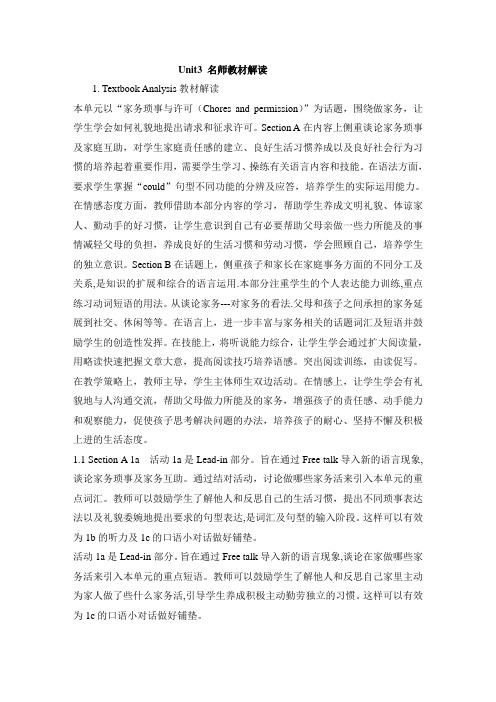
Unit3 名师教材解读1. Textbook Analysis教材解读本单元以“家务琐事与许可(Chores and permission)”为话题,围绕做家务,让学生学会如何礼貌地提出请求和征求许可。
Section A在内容上侧重谈论家务琐事及家庭互助,对学生家庭责任感的建立、良好生活习惯养成以及良好社会行为习惯的培养起着重要作用,需要学生学习、操练有关语言内容和技能。
在语法方面,要求学生掌握“could”句型不同功能的分辨及应答,培养学生的实际运用能力。
在情感态度方面,教师借助本部分内容的学习,帮助学生养成文明礼貌、体谅家人、勤动手的好习惯,让学生意识到自己有必要帮助父母亲做一些力所能及的事情减轻父母的负担,养成良好的生活习惯和劳动习惯,学会照顾自己,培养学生的独立意识。
Section B在话题上,侧重孩子和家长在家庭事务方面的不同分工及关系,是知识的扩展和综合的语言运用.本部分注重学生的个人表达能力训练,重点练习动词短语的用法。
从谈论家务---对家务的看法.父母和孩子之间承担的家务延展到社交、休闲等等。
在语言上,进一步丰富与家务相关的话题词汇及短语并鼓励学生的创造性发挥。
在技能上,将听说能力综合,让学生学会通过扩大阅读量,用略读快速把握文章大意,提高阅读技巧培养语感。
突出阅读训练,由读促写。
在教学策略上,教师主导,学生主体师生双边活动。
在情感上,让学生学会有礼貌地与人沟通交流,帮助父母做力所能及的家务,增强孩子的责任感、动手能力和观察能力,促使孩子思考解决问题的办法,培养孩子的耐心、坚持不懈及积极上进的生活态度。
1.1 Section A 1a 活动1a是Lead-in部分。
旨在通过Free talk导入新的语言现象,谈论家务琐事及家务互助。
通过结对活动,讨论做哪些家务活来引入本单元的重点词汇。
教师可以鼓励学生了解他人和反思自己的生活习惯,提出不同琐事表达法以及礼貌委婉地提出要求的句型表达,是词汇及句型的输入阶段。
初二下册英语第三单元词汇教案
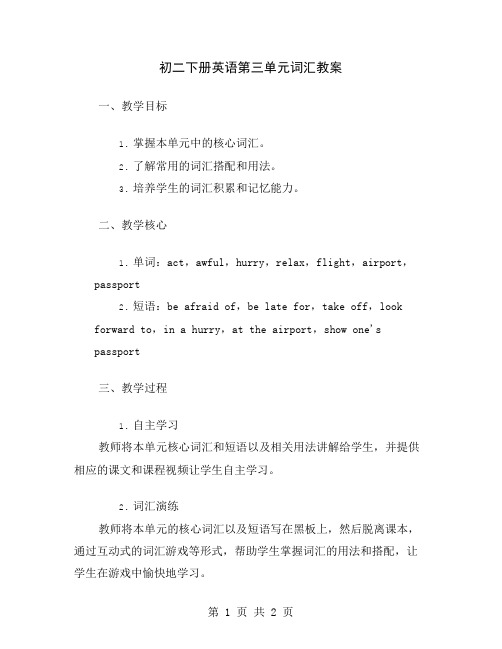
初二下册英语第三单元词汇教案
一、教学目标
1.掌握本单元中的核心词汇。
2.了解常用的词汇搭配和用法。
3.培养学生的词汇积累和记忆能力。
二、教学核心
1.单词:act,awful,hurry,relax,flight,airport,
passport
2.短语:be afraid of,be late for,take off,look
forward to,in a hurry,at the airport,show one's
passport
三、教学过程
1.自主学习
教师将本单元核心词汇和短语以及相关用法讲解给学生,并提供相应的课文和课程视频让学生自主学习。
2.词汇演练
教师将本单元的核心词汇以及短语写在黑板上,然后脱离课本,通过互动式的词汇游戏等形式,帮助学生掌握词汇的用法和搭配,让学生在游戏中愉快地学习。
3.语言运用
教师通过一系列的词汇搭配及应用句型的讲解并进行配合练习,帮助学生掌握语言用法,提高学生的语言运用水平。
四、课后评价和延伸
1.课后作业
请学生回顾本单元的词汇及短语,并用一篇100-200字的文章进行归纳总结。
2.延伸练习
以本单元所学的词汇和短语为基础,进行一场旅游计划的模拟,学生需要选择目的地并规划整个旅游计划,同时,要求学生在计划中使用所学的词汇和短语。
五、教学建议
1.引导学生使用词汇表并进行整理。
2.关注词汇的真实应用和实际场景,使学生学习的内容具有
实际意义。
3.制定更符合学生学习需求的教学方式和课程内容,如通过
多媒体形式、课程游戏、课程竞赛等方式,来提高学生的学习兴趣和积极性。
人教版英语八年级下册Unit3_Section B (2a~2e)教案与反思

Section B第4课时(2a~2e)新竹高于旧竹枝,全凭老干为扶持。
出自郑燮的《新竹》前进学校史爱东类别学习重点重点单词stress, waste, provide, anyway, depend, develop, fairness, since, neighbor,ill, drop重点短语in order to, depend on, take care of, provide sth. for sb., as a result, doone’s part in, do not mind doing sth.重点句式1.They should spend their time on school work in order to get good grades.2.There is no need for them to do it now.3.The earlier kids learn to be independent, the better it is for their future.课前预习写一写1.压力stress2.浪费;垃圾waste3.提供;供应provide4.而且;加之anyway5.依靠;依赖depend6.发展develop7.公正性fairness 8.因为;既然 since9.邻居neighbor 10.有病;不舒服ill 11.落下;掉下drop译一译1.为了in order to2.依靠depend on3.照顾take care of4.为某人提供某物provide sth. for sb.5.结果as a result6.在……上尽一份力do one’s part in7.不介意做某事do not mind doing sth.背一背1.为了取得好成绩他们应该花时间在学习上。
They should spend their time on school work in order to get good grades.2.我认为做家务没那么难。
年春人教版最新八年级英语下册《Unit3 Could you please clean your room》教案(第4课时)

课时编号:授课时间:第周星期(2014年月日)第周星期(2014年月日)科目英语年级八年级班主备教师钟丽课题Unit 3Could you please clean yourroom? Section B 1 (1a-2e)授课教师教学目标1. 生词和短语care, feed, take care of, mine2. 重点句式Could you please do these things every day?Give him water and feed him.Don’t forget to clean his bed.3.能力目标Enable students to write an e-mail message asking for help.4.学能目标Help students learn how to write an e-mail message with the target language.教学重点Expressions used to make request.教学难点Expressions used to make request.教具教法Tape recorder, a projector, a computer and test papers.教学过程教学活动个人复备Step 1 Review单项选择。
1. -- Could you please take care of my dog?-- ______. I’m too busy.A. Yes, you canB. SureC. Sorry, I can’t2. -- Could you please ____ his bed?-- Certainly!A. makesB. makingC. make3. -- Could I use your car?-- ______.A. Sure, you canB. Sorry, you canC. Sure, I can4. Could you help _____?A. making the bedB. make the bedC. made the bedStep 2 DiscussionQ1: Do you help your parents do the chores at home?Q2: Do you ask your parents’ permission for?Q3: Do your parents ask you to do some things for them?Give some pictures and answer the following questions.What do your parents ask you to do?What do you ask your parents’ permission for?Step 3Finish 1a. What do teenagers ask their parents’permission for? What do parents ask their teenagers to do?Write parents or teenagers next to each phrase.1. buy some drinks and snacks2. borrow some money3. clean your room4. invite my friends to a party5. go to the store6. use your CD player7. take out the rubbish8. make your bedStep 4.Finish 1b. Use the phrases in 1a to make conversations.Step 5 Pair work1. Parents: Could you please…?Child: Yes, sure. / Sorry, I can’t. I have to ...2. Child: Could I …?Parents: Yes, you can. / No, you can’t. You ...Finish 1c. Listen to a conversation between Sandy and her mom. Check (√ ) the things in 1a that you hear.1. buy some drinks and snacks2. borrow some money3. clean your room4. invite my friends to a party5. go to the store6. use your CD player7. take out the rubbish8. make your bedFinish 1d. Listen again. Fill in the chart.What are they going to do?Sandy’s momSandy invite her friendsSandy and DaveStep 7 Finish 1e.You are having a party. Invite your partner to come your party and ask for help with these things. So, talk about the following things with your partner.e.g.A: Would like to come to my birthday party?B: Yes, I’d love to./Sorry, I can’t. I have to…A: Could you please take out the rubbish?B: Yes, sure./No, I can’t. I have to do…1. Warming up2a. Discuss the questions with your partner1) What do you often do to help your parents at home?2) Do you think kids should help out with chores at home?2. New wordsstress n. 精神压力; 心理负担waste n.浪费; 垃圾v. 浪费; 滥用depend v. 依靠; 依赖w W w . X k b 1.c O mdevelop v. 发展; 壮大fairness n.公正性; 合理性since conj. 因为; 既然prep., conj. & adv. 从……以后; 自……以来eighbor(= neighbour) n. 邻居drop v. 落下; 掉下3. Skimming2b. The Sunday Mail magazine invited parents to write about whether they think young people should do chores at home. Skim the following letters. Which one agrees and which one disagrees?了解阅读策略:Skimming 意为“快速掠过,从中提取最容易取得的精华”。
新人教版八年级英语下册教案Unit 3 Could you please clean your room Period 4教案
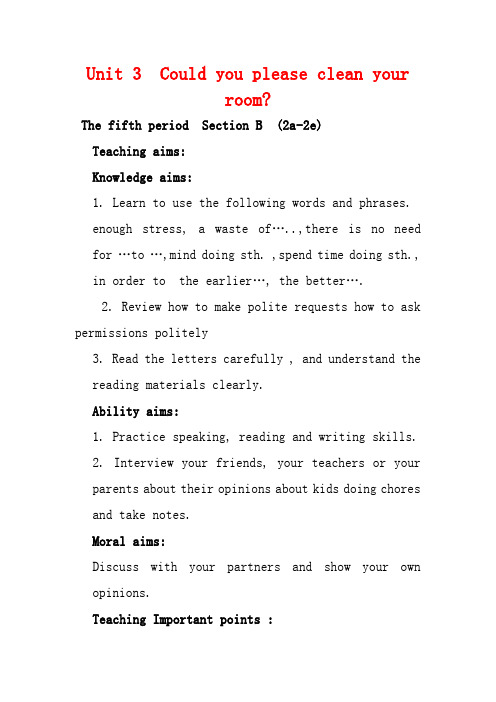
Unit 3 Could you please clean yourroom?The fifth period Section B (2a-2e)Teaching aims:Knowledge aims:1. Learn to use the following words and phrases.enough stress, a waste of…..,there is no need for …to …,mind doing sth. ,spend time doing sth., in order to the earlier…, the better….2. Review how to make polite requests how to ask permissions politely3. Read the letters carefully , and understand thereading materials clearly.Ability aims:1. Practice speaking, reading and writing skills.2. Interview your friends, your teachers or yourparents about their opinions about kids doing chores and take notes.Moral aims:Discuss with your partners and show your own opinions.Teaching Important points :Learn to use some important phrases and target languages.Teaching difficult points:1.Improve Ss’ ability to retell the letters.2.Interview your friends, your teachers or yourparents about their opinions about kids doing chores and take notes.3.Express your opinions about doing chores.Teaching procedures:Step 1 Warming-up1.Sing an English song.2.Free talk about doing chores. Could youplease ….?/Yes, sure. /….Step 2. Before reading.1.Watch a video about doing chores.2.Let Ss say out the chores in the video.eg: clean your room /help do the dishes / take the dog for a walk…3.Ask Ss to discuss the following questions witha partner.①What do you often do to help your parents at home?②Do you think kids should help out with chores athome?Students share their answers. Let Ss list the chores they can do.Step 3. While reading1.What’s “Skimming”?2. Fast reading. The Sunday Mail magazine invited parents to write about whether they think young people should do chores at home. Skim the following letters and answer the question:. Who doesn’t agree that students should do chores at home, Mr. Smith or Ms. Miller?3. Careful reading.(1).Read the first letter, and answer the following questions:Q1.What does Ms. Miller think the students should do at home?Q2.Why does Ms. Miller think there is no need for the students to do chores at home?Q3.Who does Ms. Miller think should provide a clean and comfortable home?(2).Read the second letter, and answer the following questions:Q1.Does Mr. Smith think children depend on their parents too much?Q2.How can doing chores help children in Mr. Smith’s opinion?Q3.What does Mr. Smith want us to learn from his neighbor’s story?(3).Let the Ss read the two letters, and fill in the chart in 2c.①.Read the examples, and guess the meanings of “pro”and “con”.②.According to Mr. Smith and Ms. Miller, what are the pros and cons about kidsdoing chores.(4).Students read the two letters and find out the difficult points.(5).Discuss and try to use the useful expressions in groups.a waste of…..there is no need for …to …mind doing sth.Spend time doing sth.in order tothe earlier…, the better….Step 4 After reading.1. Retell the two letters according to the key words and the chart.2. Discuss the question with a partner.Which letter do you agree with? Why?Step 5 Homework.Do you think children should do some chores at home? Make a survey in your class. Then write a report.The sixth period Section B (3a-self check )复习课Teaching aims:Knowledge aims:1. Review the following words and phrases.help with housework and chores at home, enough stress,a waste of…..,there is no need for …to …,minddoing sth. ,spend time doing sth., in order to the earlier…, the better…. It is important for sb. to do sth. develop children’s independence2. Review how to make polite requests how to ask permissions politelyAbility aims:1. Learn how to show your own opinions.2. Practice speaking, and writing skills.Moral aims:Discuss with your partners and show your own opinions.Teaching Important points :1. Learn how to show your own opinions.2. Practice speaking, and writing skills.Teaching difficult points:1.Improve Ss’ ability to write letters.2.Express your opinions about doing chores.Teaching procedures:Step 1 Warming-up1.Sing an English song.2.Free talk about doing chores or asking for parents’ permissions..Could you please ….?/Yes, sure. /…. /Could I ? /Step 2 Revision1.Have a dictation.2.Ask students to sum up the words and useful expressions in this unit.3.Ask students to complete Self check 1Check the answers:1. do the dishes2.clean your room/ the living room3.make the bed.4. fold the clothes.5. sweep the floor6. take out the rubbishStep 3 Practice1. Make conversations about doing chores or asking for parents’ permissions.eg : (1).A. Could you please sweep the floor / ?B. Yes, sure. Could you please do the dishes?A. No problem.(2).A. Could I invite my friends to a party / ?B. No, you can’t have a party. You have a teston Monday.2. Complete Self check 2.Are these polite requests or permissions? Write the numbers in the correct places in the chart.Then check the answers.3. Let the students use the questions in Self check2 to write a conversation.4. Ask several students to read out theirconversations.Step 4. Writing .1.Discuss the questions with a partner. And takenotes.Do you think children should do some chores at home?Why or why not?2.Encourage students to give their ideas.3. How to write a letter1. 信头:发信人地址和日期。
人教版八年级下册英语教案(全册)
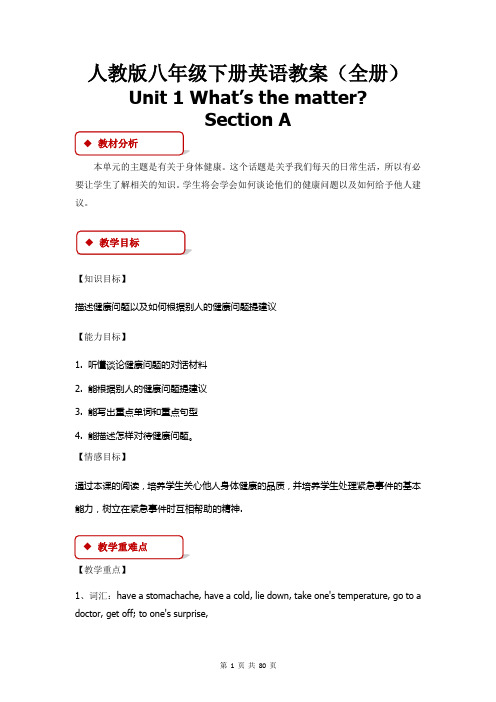
人教版八年级下册英语教案(全册)Unit 1 What’s the matter?Section A◆教材分析本单元的主题是有关于身体健康。
这个话题是关乎我们每天的日常生活,所以有必要让学生了解相关的知识。
学生将会学会如何谈论他们的健康问题以及如何给予他人建议。
◆教学目标【知识目标】描述健康问题以及如何根据别人的健康问题提建议【能力目标】1.听懂谈论健康问题的对话材料2.能根据别人的健康问题提建议3.能写出重点单词和重点句型4.能描述怎样对待健康问题。
【情感目标】通过本课的阅读,培养学生关心他人身体健康的品质,并培养学生处理紧急事件的基本能力,树立在紧急事件时互相帮助的精神.◆教学重难点◆【教学重点】1、词汇:have a stomachache, have a cold, lie down, take one's temperature, go to a doctor, get off; to one's surprise,2、句型:1. ——What's the matter?——I have a stomachache. You shouldn't eat so much next time.2 . ——What's the matter with Ben?——He hurt himself. He has a sore back.——He should lie down and rest.【教学难点】掌握情态动词should shouldn't.的用法;学习have的用法◆课前准备◆Multimedia, group work, cooperative discussion.◆教学过程Step1. Warm up1. Look at the picture and learn the parts of the body.2. New words and phrases.Step 2 Presentation1. 1aLook at the picture. Write the correct letter [a-m] for each part of the body. Then check the answers.2. 1bFirst, lead Ss to read the five names.Then look at the picture. Number the names 1-5.Finally, check the answers.3. 1cDivide two Ss into a pair to make conversations. Finally, invite several pairs to act out for the class.Step 3 Practice1. 2aTell Ss there are five conversations. In each conversation the person says what’s going on with them. Listen carefully and number the pictures.Play the tape. Then check the answers.2. 2bAsk Ss to listen to the recording again to match the problems with the advice.Play the recording again. Then check the answers.3. 2cAsk Ss to make conversations using the information in 2a and2b. Give them enough time to do this task. Later, invite several pairs to present their conversations to the class.Step 4 Consolidation1. 2dFirst, ask Ss to have a fast reading of the conversation to get the main idea.Then, lead Ss to read the conversation sentence by sentence, explain some language points.Finally, divide Ss into pairs to practice role-playing the conversation.2. 3aFirst, read the passage quickly and answer the question.Then, lead Ss to read the passage and analyse the key points.Finally, read together.3. 3bRead the passage again and check the things that happened in the story3cDiscuss the questions with a partner.4. Grammar focusFirst, lead Ss to read the sentences.Then, prompt Ss to analyse the use of model verb should.After that, explain the grammar together.5. 4aAsk Ss to fill in the blanks.Then , invite some Ss to present their answers.6. 4bAsk Ss to circle the best advice for these health problems, then add their own advice.After that, invite some Ss to present their advice.7. 4cOne student mimes a problem. The other students in your group guess the problem and give advice.Step 5 Language pointsStep 6 HomeworkMake a conversation about health problems and giving advice.Unit 1 What’s the matter?Section B◆教材分析本单元的主题是有关于身体健康。
人教版英语八下 unit3 复习教案

个性化教学辅导教案( )1.Gina doesn't ________.She looks as beautiful as two years ago.A.finish B.decide C.change D.arrive( )2.Old Henry lives ________.He often feels ________.A.alone;alone B.alone;lonelyC.lonely;lonely D.lonely;alone( )3.—I have got a ________ that other workers don't like me.—It's not what you think.They are just too busy to talk with you.A.feeling B.letter C.decision D.journey( )4.The good news of our basketball team winning the game ________ the whole class.A.cheered up B.put up C.got up D.looked up( )5.—The article is really difficult.A.read B.speak C.understand D.write1.Peter ,could you please take out the trash? 彼得 ,你能把垃圾倒了吗?【解析1】Could you please do sth ?请你〔做〕......好吗?用于提出请求 ,希望得到对方的肯定答复 ,说话的语气比拟客气委婉。
Could 不是can的过去式 ,是委婉、礼貌的说法。
答复用can.【常用答语】肯定答复:Sure./ Of course./ Certainly./No problem.否认答复:Sorry , I can’t— Could I borrow your camera?— ___________ ,but please give it back by Saturday.A. I am sorryB. Of courseC. Certainly notD. No, thanks 【2019内蒙古呼和浩特】Tom , would you please ___ the box? It’s for your sister.A. not openB. don’t openC. not to openD. to not open 【解析2】take out 取出〔v+ adv〕【注】: 跟代词做宾语 ,代词放中间;跟名词做宾语 ,可放在中间 ,也可放在后边His teeth hurt badly. The dentist ______.A .take out it B. take out them C. take it out D .take them out【短语】take out the trash 倒垃圾 take a walk 散步 take away 拿走 ,取走A. happyB. happierC. happilyD. more happily —Remember this , children . _______careful you are , _______mistakes you will make . —We know , Mr. Li .A. The more; the moreB.The fewer; the moreC. The more; the fewerD. The less; the less( )1.—What makes you ________ the job?—Because I'll move to another city.A.set up B.look for C.cut off D.give up( )2.—We should ________ a plan for the garden party.—Yes ,I think so.A.come up B.come up with C.catch up D.catch up with( )3.His family ________ be really poor.But now they have much money.A.is used to B.was used to C.used to D.use to( )4.—Do you know ________ look after a baby?—Sure ,I always help my mom look after my little sister.A.what can B.what to C.how can D.how to( )5.—I like to work with kids.—________.A.You can give out food to the old people B.You can help to clean the houseC.You can volunteer in the factory D.You can help the kids with their studies( )1. —Could you make your bed and wash your clothes?—________.A.Excuse me B.All rightC.No D.Good idea( )2. He ________ his umbrella to me yesterday, so I didn't get wet.A.borrowed B.keptC.lent D.bought( )3. —Your father is sleeping. Would you mind turning down the TV?—________. I'll do it right away.A.Not at all B.Of courseC.No way D.Sounds good( )4. —Could I borrow your computer, Bob?—Sorry, I am ________it.A.taking out B.turning onC.working on D.turning off( )5. We have two foreign teachers here. One is from England, and ________is from America.A.another B.the otherC.other D.the others( )6. There are two bikes under the tree, but ________ of them is new.A.all B.none C.neither D.either( )7. She plays sports every day in order ________ healthy.A.keep B.to keep C.keeping D.kept( )8. Don't ________ others. You can do it well by yourself.A.put on B.tur n off C.put up D.depend on( )9. Jane has learned the piano________ two hours ago.A.for B.at C.in D.since( )10. Could you please ________ my child when I'm away?A.look for B.look at C.take care of D.care ofMost children don't enjoy doing housework. They like playing computer games rather than cleaning the rooms. But in Australia, Jim and Robert's mother, Mrs. Black, has good and proper methods to get their children to do housework.Here is an example.“Mom, have you worked out next week's housework? Let Jim and me choose the cards. I can't wait. It's fun!〞When Robert shouted out, his mother had already put all the cards on theirbig table. On the cards, there are some words like these, “sweep the floor, clean your bedroom, help mom cook, wash vegetables, make beds, feed the fish, cut the wood, clean the bathroom〞 and many others. Jim and Robert chose two cards for each day from Monday to Friday. Then they would hang them on the weekday task board. Jim likes to clean the bathroom, so he picked up the card “clean the bathroom〞. Robert loves to make the bed so he picked up his favorite card. Jim again picked up “wash vegetables〞and Robert chose “feed the fish〞. Soon the two boys were happy to t ake away all the cards.To help the children do housework, their mother thought hard and came up with this idea. Of course, the parents did the housework on the weekends and left Jim and Robert two days free.( )1. From the passage we know that most children like ________.A.doing housework B.playing computer gamesC.playing cards D.doing housework( )2. Jim and Robert chose ________ card for the weekdays from Monday to Friday.A.two B.four C.eight D.ten( )3. Jim likes to ________.A.clean the bathroom B.make the bedC.feed the fish D.sweep the floor( )4. The underlined phrase “came up with〞probably means “________〞.A.looked at B.gave upC.thought of D.believed in( )5. Who did the housework on the weekends?A.Jim B.Robert。
八年级下册人教版英语unit3知识点
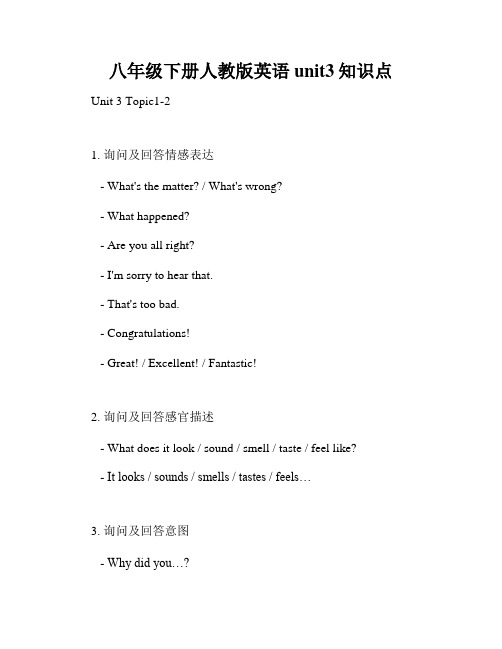
八年级下册人教版英语unit3知识点Unit 3 Topic1-21. 询问及回答情感表达- What's the matter? / What's wrong?- What happened?- Are you all right?- I'm sorry to hear that.- That's too bad.- Congratulations!- Great! / Excellent! / Fantastic!2. 询问及回答感官描述- What does it look / sound / smell / taste / feel like?- It looks / sounds / smells / tastes / feels…3. 询问及回答意图- Why did you…?- What are you going to …?- What do you intend to…?- I intend to… / I plan to…4. 问路及指路,口语表达中熟悉的方向词汇- Excuse me, could you tell me the way to…?- How can I get to…?- The nearest bus stop / subway station / bank / post office is… - It's on the left / right / opposite…Unit 3 Topic 3-41. 表达偏好及兴趣- Would you like…?- What kind of…do you like?- Do you prefer…to…?- I'm into…- I'm fond of…- I enjoy…2. 指出和辨认物品及人物(描述外貌和服装)- What does he / she look like?- He / She has…(描述头发颜色、眼睛、身材特征、穿戴等)3. 询问及描述活动安排- What are you going to do…?- What will you do…?- I'll…4. 描述天气- What's the weather like today?- It's sunny / cloudy / rainy / snowy / windy…- It's hot / warm / cool / cold…Unit 3 Topic 5-61. 表示和理解时间和星期- What time is it?- What's the date today?- What day is it today?- How many days are there in a week?- What do you usually do on weekends?2. 描述行程及活动- Tomorrow, I'm going to…(描述行程)- On Monday / Tuesday / Wednesday…, I usually… - In the morning / afternoon / evening / at night…, I…3. 询问及回答感受- How do you feel?- I feel…(描述感受)4. 描述位置- Where is the…? It's…(描述方位)以上是八年级下册人教版英语unit3的知识点总结,有效巩固这些知识点,可以让你在英语学习中更加得心应手。
- 1、下载文档前请自行甄别文档内容的完整性,平台不提供额外的编辑、内容补充、找答案等附加服务。
- 2、"仅部分预览"的文档,不可在线预览部分如存在完整性等问题,可反馈申请退款(可完整预览的文档不适用该条件!)。
- 3、如文档侵犯您的权益,请联系客服反馈,我们会尽快为您处理(人工客服工作时间:9:00-18:30)。
个性化教学辅导教案()1.Gina doesn't ________.She looks as beautiful as two years ago.A.finish B.decide C.change D.arrive()2.Old Henry lives ________.He often feels ________.A.alone;alone B.alone;lonelyC.lonely;lonely D.lonely;alone()3.—I have got a ________ that other workers don't like me.—It's not what you think.They are just too busy to talk with you.A.feeling B.letter C.decision D.journey()4.The good news of our basketball team winning the game ________ the whole class.A.cheered up B.put up C.got up D.looked up()5.—The article is really difficult.—Yes,it is.I can't ________ its meaning at all.A.read B.speak C.understand D.write1.Peter ,could you please take out the trash? 彼得,你能把垃圾倒了吗?【解析1】Could you please do sth ?请你(做)......好吗?用于提出请求,希望得到对方的肯定回答,说话的语气比较客气委婉。
Could 不是can的过去式,是委婉、礼貌的说法。
回答用can.【常用答语】肯定回答:Sure./ Of course./ Certainly./No problem.否定回答:Sorry , I can’t— Could I borrow your camera?— ___________,but please give it back by Saturday.A. I am sorryB. Of courseC. Certainly notD. No, thanks 【2019内蒙古呼和浩特】Tom , would you please ___ the box? It’s for your sister.A. not openB. don’t openC. not to openD. to not open【解析2】take out 取出(v+ adv)【注】: 跟代词做宾语,代词放中间;跟名词做宾语,可放在中间,也可放在后边His teeth hurt badly. The dentist ______.17.The earlier kids learn to be independent , the better it is for their future.孩子们越早学会独立,对他们的未来越好。
【解析】the + 比较级,the + 比较级“越...... 越...... ”The more you smile, the _______ you will feel.A. happyB. happierC. happilyD. more happily—Remember this , children . _______careful you are , _______mistakes you will make . —We know , Mr. Li .A. The more; the moreB.The fewer; the moreC. The more; the fewerD. The less; the less()1.—What makes you ________ the job?—Because I'll move to another city.A.set up B.look for C.cut off D.give up()2.—We should ________ a plan for the garden party.—Yes,I think so.A.come up B.come up with C.catch up D.catch up with()3.His family ________ be really poor.But now they have much money.A.is used to B.was used to C.used to D.use to()4.—Do you know ________ look after a baby?—Sure,I always help my mom look after my little sister.A.what can B.what to C.how can D.how to()5.—I like to work with kids.—________.A.You can give out food to the old people B.You can help to clean the houseC.You can volunteer in the factory D.You can help the kids with their studies( )1. —Could you make your bed and wash your clothes?—________.A.Excuse me B.All rightC.No D.Good idea( )2. He ________ his umbrella to me yesterday, so I didn't get wet.A.borrowed B.keptC.lent D.bought( )3. —Your father is sleeping. Would you mind turning down the TV?—________. I'll do it right away.A.Not at all B.Of courseC.No way D.Sounds good( )4. —Could I borrow your computer, Bob?—Sorry, I am ________it.A.taking out B.turning onC.working on D.turning off( )5. We have two foreign teachers here. One is from England, and ________ is from America.A.another B.the otherC.other D.the others( )6. There are two bikes under the tree, but ________ of them is new.A.all B.none C.neither D.either( )7. She plays sports every day in order ________ healthy.A.keep B.to keep C.keeping D.kept( )8. Don't ________ others. You can do it well by yourself.A.put on B.tur n off C.put up D.depend on( )9. Jane has learned the piano________ two hours ago.A.for B.at C.in D.since( )10. Could you please ________ my child when I'm away?A.look for B.look at C.take care of D.care ofMost children don't enjoy doing housework. They like playing computer games rather than cleaning the rooms. But in Australia, Jim and Robert's mother, Mrs. Black, has good and proper methods to get their children to do housework.Here is an example.“Mom, have you worked out next week's housework? Let Jim and me choose the cards. I can't wait. It's fun!”When Robert shouted out, his mother had already put all the cards on their big table. On the cards, there are some words like these, “sweep the floor, clean your bedroom, help mom cook, wash vegetables, make beds, feed the fish, cut the wood, clean the bathroom” and many others. Jim and Robert chose two cards for each day from Monday to Friday. Then they would hang them on the weekday task board. Jim likes to clean the bathroom, so he picked up the card “clean the bathroom”. Robert loves to make the bed so he picked up his favorite card. Jim again picked up “wash vegetables” and Robert chose “feed the fish”. Soon the two boys were happy to t ake away all the cards.To help the children do housework, their mother thought hard and came up with this idea. Of course, the parents did the housework on the weekends and left Jim and Robert two days free.( )1. From the passage we know that most children like ________.A.doing housework B.playing computer gamesC.playing cards D.doing housework( )2. Jim and Robert chose ________ card for the weekdays from Monday to Friday.A.two B.four C.eight D.ten( )3. Jim likes to ________.A.clean the bathroom B.make the bed。
